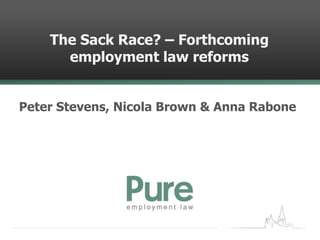The Sack Race?
- 1. The Sack Race? â Forthcoming employment law reforms Peter Stevens, Nicola Brown & Anna Rabone
- 2. Employment Tribunal Claims âĒ Year to 31 March 2011 âĒ 218,100 cases âĒ 382,400 claims
- 3. Employment Tribunal Claim March to September 2011 âĒ 40,300 cases âĒ 30% reduction on 2010
- 4. Employment Tribunal Claims âĒ Of 382,400 claims: 47,900 Unfair dismissal + 16,000 Redundancy pay 930 Reason for dismissal 64,830 âĒ 317,570 â no qualification period
- 5. Unfair Dismissal Increase in qualification period âĒ 1 to 2 years âĒ 6 April 2012 âĒ Reduce claims by 3,700 to 4,700 per year
- 6. Transitional Provisions âĒ Only apply to employees who start on or after 6 April 2012
- 7. Unfair Dismissal âĒ Encourage recruitment âĒ Rules are barrier to recruitment
- 8. Unfair Dismissal âĒ 6 month qualification period (1970s) âĒ 2 year qualification period (1980s) âĒ 1 year qualification period (2000s) âĒ No evidence of impact on recruitment
- 9. Unfair Dismissal âĒ Increase in discrimination claims âĒ R (Seymour-Smith) v S of S for Employment (2000) HL âĒ Age discrimination
- 10. Fines and Fees Nicola Brown
- 11. Introduction of fines (1) âĒ âFinancial penaltiesâ for employers âĒ 50% of award made âĒ minimum ÂĢ100 âĒ maximum ÂĢ5,000 âĒ Payable to the Exchequer âĒ Early payment discount âĒ In addition to uplift under ACAS Code
- 12. Introduction of fines (2) âĒ Consultation responses - concerns about âunintended or accidental shortcomingsâ âĒ Judges will have discretion to impose the financial penalty
- 13. Deposit orders and costs âĒ âAddress business concerns about weak claimsâ âĒ Deposit orders â cap increasing from ÂĢ500 to ÂĢ1,000 âĒ Cap on costs to increase from ÂĢ10,000 to ÂĢ20,000
- 14. Introduction of fees âĒ Employment Tribunals are currently 100% funded by taxpayers - annual cost ÂĢ84 million, average ÂĢ1,800 per case âĒ Transfer the burden on to those who use the system or who cause the system to be used âĒ Currently consulting about reform â closes 6 March 2012, changes coming in 2013/4?
- 15. Proposal One âĒ Level 1 â wages, notice, redundancy etc âĒ Level 2 â unfair dismissal âĒ Level 3 â discrimination, equal pay, whistleblowing âĒ Issue fee = ÂĢ150 - ÂĢ250 âĒ Hearing fee = ÂĢ250 - ÂĢ1,250 âĒ Other fees, e.g. Dismissal fee = ÂĢ60 (payable by Respondent)
- 16. Proposal Two âĒ Single charging point âĒ Fee = ÂĢ200 - ÂĢ600 âĒ For claims of ÂĢ30,000 or more = ÂĢ1,750 âĒ How should claims be valued?
- 17. Fees âĒ Paid by the other party if you win (unless Tribunal orders otherwise) â but what is a win? âĒ Separate fees for multiple claims âĒ No infrastructure in the Employment Tribunals
- 18. The remission system âĒ Tim â claims unfairly made redundant, has since secured another job at a lower salary. His wife works part time earning ÂĢ6,000 and they have 3 children âĒ Entitled to full remission if the coupleâs income is ÂĢ26,790 or less âĒ Get the claim in before you get a new job!
- 19. Protected Conversations Anna Rabone
- 20. Protected Conversations âĒ David Cameron - âso a boss and an employee feel able to sit down together and have a frank conversation â at eitherâs requestâ. âĒ Will not be admissible in proceedings.
- 21. Protected Conversations âĒ Nick Clegg - âconfidence to be open about performance, about retirement with their employeesâ. âĒ At consultation stage.
- 22. Protected Conversations âĒ Issues: âĒ Elements that are not protected (discrimination). âĒ Refusal to engage in protected conversations. âĒ Systems already in place.
- 23. Protected Conversations âĒ Advantages â Address issues more directly â No fear of reprisal âĒ Disadvantages â False sense of security â Will not cover all scenarios â More complex legislation or guidance for employers to grapple with
- 25. Other Reforms âĒ Employment Tribunal lay members âĒ Witness statements taken as read âĒ Schedule of loss from outset
- 26. Other Reforms âĒ The role of ACAS âĒ Early Conciliation
- 27. Other Reforms âĒ Rapid resolution of simple claims âĒ Regional mediation networks
- 28. Other Reforms âĒ Increase in statutory caps âĒ Basic award - ÂĢ400 to ÂĢ430 âĒ Compensatory award - ÂĢ68,400 to ÂĢ72,300
- 29. Other Reforms âĒ TUPE Service Provision Changes âĒ Collective Redundancy Consultation
- 30. Other Reforms âĒ Compromise Agreements âĒ Equality Act s 147 âĒ independent adviser may not be a party to the contract or a person acting for a party to the contract âĒ anomaly being addressed
- 31. And Finally âĒ Compromise Agreements (ERA 1996) âĒ Qualifying Compromise Contracts (Equality Act 2010) âĒ Settlement Agreements
- 32. Any Questions?
































